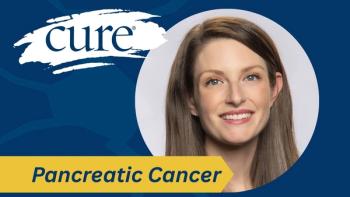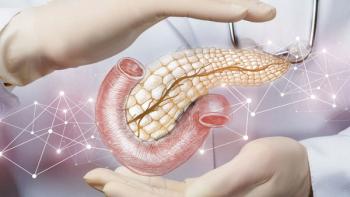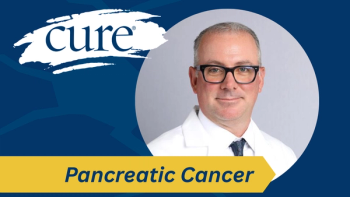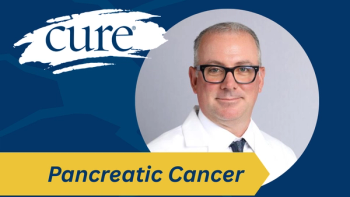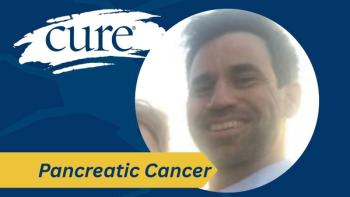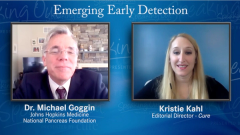
Patient Experience with Early Detection
Kristie L. Kahl: Can you talk about what your relationship is to pancreatic cancer?
Tom Birsic: So I first became aware of pancreatic cancer a little over 24 years ago, when my sister, Joan Birsic-Dawson, was originally diagnosed with pancreatic cancer. And I come from a very large family, there were nine of us. And we had lots of accomplished people in the family. We had doctors and lawyers and Joan was the best among us. So Joan had a master's degree in pediatric nursing. And she would, in addition to being a mother of two lovely young girls, would volunteer time to go into the roughest neighborhoods in Pittsburgh, and take care of expectant single mothers and mothers who were single and had just had babies. And she did this on her own time. And she was just a wonderful person.
So when she was diagnosed with pancreatic cancer, it was a shock to all of us. We'd never heard of that. A doctor came out, told all of us that she had pancreatic cancer, and she ought to get her affairs in order, because there was really nothing that could be done. And it was really mind boggling and unbelievable to us. And so from that point on, the doctors in the group started exploring the credibility of the diagnosis and the prognostication as to the fact that there was nothing that could be done. And my wife, Patter who's nearly 100% Irish and very stubborn and got very angry and decided we all ought to do something. And we ought to file that. Get a foundation together, to try to raise money to make sure that there was something that was going on and could be done for other people that had a diagnosis of pancreatic cancer. And so, Joan, we found her a trial that was going on at Johns Hopkins. But she passed away. And that's when we got the foundation going full steam.
Kristie L. Kahl: Since Joan’s death, what steps have you taken for early detection?
Tom Birsic: After being bugged, myself, by my wife, Patter, who was the co-founder of the National Pancreas Foundation, to get genetic testing for about a dozen years. And I ignored her for many, many, many years. Ignore that advice and ignore the advice of great doctors on our boards like Dr. Randy Brand. I finally realized that one of my adopted sisters, and my first cousin, got a genetic test and found that she had the BRCA1 gene mutation and advised me of that and that sort of turned the light on for me.
My grandfather, at age 92, died of pancreatic cancer. My sister died of pancreatic cancer. My first cousin had the BRCA1 gene mutation, which gives an eight-fold increase of risk factor for pancreatic cancer and for women gives a horrendously high-risk factor for breast cancer and for ovarian cancer.
So I decided to call up my good friend, Dr. Randy Brand and schedule an appointment, and found out that I had the BRCA1 gene. For somebody who was resistant for so long, I realized knowledge is power here. And one of the most stunning things about this, and I still remember to this day, about pancreatic cancer is that it's really hard stuff. It's a really tenacious, ferocious and hard cancer, because it sneaks up on you. And by the time you properly diagnose it, it's nearly too late. And so the statistics are really not with people once they get diagnosed. And it's like every cancer: The sooner you discover it, and you can detect it, the better off your odds are.
There's research now that confirms that you're better off knowing. And so early detection has been really important. And an important part of that is understanding your own genetics. After the “I told you” so’s, I decided to get the test. And then, I worked with Dr. Brand and his team to put together a package for all my siblings, and my nephews and nieces, including my own daughter. This is the gene mutation that Angelina Joli had, and you have to make decisions. And knowledge is power in all kinds of health. So that was my first early detection message.
It was great, because Dr. Brand's team ranged all over the country, the different centers where people could get tested and the package of materials and information. It was just really, really wonderful. And myself, as a result of coming out of that, I decided that I'm doing a yearly endoscope, and a procedure where they essentially put a scope there and look at your pancreas and figure out if there's anything going on, which is right now, the best we have, as I understand it.
Kristie L. Kahl: Why was genetic testing so important to you?
Tom Birsic: Knowledge is power. And if you understand that, your best odds are catching this thing early. And if you understand, as we do, from our own personal experience in our family, that by the time people get diagnosed with this, so they'll feel a pain in their side, they'll think they have a gallstone. They go in, they get it checked, and pretty soon, you've got 18 months to live. That's the standard. Genetic testing tells your odds are much greater of getting this thing. And you need the impetus to be really tuned in to early detection that is really heightened when you understand both your genetic profile, and then you really have to examine what's available in terms of early detection. That's part of what the National Pancreas Foundation is really doing now is being a real information resource for people who are in this position. And where does one go for knowledge and for information? That's where we're putting a lot of our emphasis. And we're putting research dollars into early detection. And it's, it's really the holy grail for most of us that have been involved in this fight against pancreatic cancer.
Kristie L. Kahl: What hesitations dp people have when it comes to genetic testing? And what would you say to them if they do have hesitations?
Tom Birsic: I understand the hesitation because, as I said myself, given my own family history, knowing my grandfather died of pancreatic cancer, my sister, Joan, died of pancreatic cancer, I was reluctant to just take that simple step to do the genetic testing that Patter had been encouraging me to do for five or six years before I actually did it. I just think human beings are wired, in some sense, to just say, leave well enough, alone, I feel fine. What good would it do me? I I'd rather not know. Those sorts of things. Oh, I did, you know, 23andme, or whatever that test was, and that didn't show anything? Those things create an inertia, a status quo of, “I'll put it off, I won't do it.” But it's such a simple procedure. And it you gain so much by doing it. If you don't have a genetic issue, that's great. And if it's not in your family, that's great. But that doesn't mean that there isn't something there lurking. And you might as well. It’s very easy.
Kristie L. Kahl: How can patients start the conversation about their family history of pancreatic cancer and making sure that they do get tested?
Tom Birsic: I think that's a great question. It goes to another core mission of the National Pancreas Foundation, and that is awareness. People underestimate the mission of awareness, right? You say, okay, we principally want to raise funds for research into early detection and cures of pancreatic cancer and pancreatitis, but awareness is also important. This disease is a tough one. It sneaks up on people. It just comes at them out of the blue, right? And they don't want to think about that. Until it's too late. And it becomes a very tragic thing, right?
It’s good to understand what's been going on in your extended family. What are people suffering from? What if people died from it? In this day and age, especially with younger people today, with all the resources available and all the increases in science, it's been amazing.





